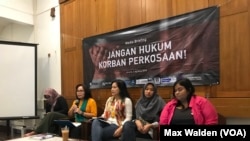Agni had never dreamed of taking her rapist to court, all she wanted when she came forward about her experience was for the perpetrator to receive administrative sanctions. Agni, a student at Gajah Mada University in Yogyakarta, says she was sexually assaulted by a fellow student during an internship in Maluku in July 2017.
Sukiratnasari, Agni’s legal representative, said her client only wanted the case to be resolved within the university and demanded the alleged rapist apologize in a statement.
“We have agreed on several things, such as an apology. And the university has formed an ethics committee to investigate the case although we have yet to receive the result,” she said.
But Agni was caught by surprise when Arif Nurcahyo, the head of Security, Safety and Environment at the Gajah Mada University, filed a report to the police last December. Nurcahyo told reporters he decided to report the case because he felt a moral obligation to do so as a staff of the university.
“I’m responsible for the safety of the campus, so I represent the university here,” he said.
But Sukiratnasari is worried the police report will backfire and end up with the victim being criminalized. “We’ve seen from the statement of the Yogyakarta police, if the rape is not proven it can be a false report. And the lawyer of the perpetrator also said the same, if it’s not proven there is a possibility victim will be reported instead for filing false report and defamation,” she told VOA.
Flawed law and victim blaming
In Indonesia, the law on rape is regulated by the Criminal Code in chapter 14 on crimes against morality. But according to Mariana Amiruddin, the Commissioner of National Commission on Violence against Women (Komnas Perempuan), the law does not side with the rape victim because it requires a medical forensic examination.
“Meanwhile, many victims choose to recover first from their horrible experience and some are still afraid to report, and others only have courage to come forward much later. But the evidence is only visum et repertum [examination], what if a victim experienced it a year before,” Amiruddin told VOA.
Sukiratnasari said with the filed report, Agni was asked to undergo the examination. Nevertheless, the victim refused because the rape occurred in 2017. “What will she get? The physical evidence will be gone by now, that’s why we want to have a psychological examination instead of physical,” she added.
The lawyer said Agni had to overcome depression because of the sexual assault and deal with victim blaming. She mentioned that many people blamed the victim for what happened and claimed it was consensual.
Amiruddin is not surprised, saying victims always have the fear that when they come forward to the public, they will be blamed or people will think they are making things up. “Only when the victim suffers abuse with a visible scar or if they died, then the public will believe them,” she said.
The tip of the iceberg
According to the Komnas Perempuan annual report in 2018, they received 2,979 reports of sexual assault. Amiruddin said the number has increased from previous years because there are more victims who want to report rape. Nevertheless, cases such as Agni’s that become public, are just the tip of the iceberg because there are still a large number who prefer to stay silent.
“Especially in campus or university, there’s a tendency to cover up or close the case because they want to maintain the reputation of the institution. But if they treat the victims fairly, it would be better for their reputation,” she said.
Based on Komnas Perempuan data, only one higher educational institution in Java has a guideline against sexual harassment and sexual violence. Amiruddin said there should be a mechanism for universities to deal with cases of harassment or rape.
“There are a lot of cases that happen in campuses too,” she added.
Anti-sexual violence bill
Amiruddin said the commission has been advocating for the government to pass the anti-sexual violence bill, which will result in a law that can better protect victims of rape and sexual violence.
“Until now, the law on rape is still referring to the criminal code which doesn’t have gender perspective and it was created 100 years ago,” she said.
She said if the bill is passed, the criminal code can be revised to refer to the anti-sexual violence law. She hoped that with the law, victims of rape or sexual assault who have been criminalized can find justice. But Amiruddin admitted progress to pass the bill is slow, although the House of Representatives and the Ministry of Women’s Empowerment and Child Protection have been discussing it.
“They promised to pass it this year,” she said.





